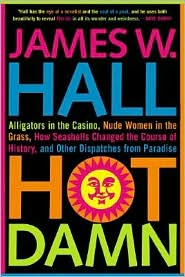What I See -- James Hall's Essays and Florida

On my father's recent visit from Florida, he brought me a stack of books, one of them James Hall's collection of essays, Hot Damn!
James Hall is a poet and crime novelist, but he once wrote essays for a newspaper for several years. This book is a collection of those essays.
The topics of Hall's essays range widely -- from adventures in Florida to experiences as a boy in a library, to buying a house, to eating Cheetos while watching sports. But one theme is consistent throughout: the celebration of life. Falling in love with something. Getting excited about an adventure or place that others might simply regard as ordinary.
I believe this attitude is something I've largely forgotten. Let me excerpt a few paragraphs that demonstrate his love for life, especially Florida.
In "Home at Last," Hall explains that he turned down the Air Force Academy to attend Florida Presbyterian College -- not for religious reasons, but to escape in to Florida:
I did four glorious years of college in the charming and soporific Satin Petersburg of the sixties. On holidays I explored the west coast, the Keys, camping at starkly primitive Bahia Honda, building bonfires on midnight beaches, discovering out-of-the-way taverns that served cheap pitchers of beer and spectacular cheeseburgers, bays where fish jumped happily into frying pans, the unair-conditioned piano bars in Key West where writers huddled in the corners and talked the secret talk. I had never felt so at home.
In "Florida Trifecta," spending time near ancient ceremonial grounds, Hall writes,
As my psychic tuning fork hummed, we drank a beer together on a peak overlooking one of the assembly plazas and were quieter than we would have been almost anywhere else on earth. I no longer cared if we went over to Cabbage Key. This was fine. We could stay there all afternoon, standing shoulder to shoulder with the ghosts of our noble forebears who knew and loved this land when its waters were crystalline and dense with fish, its breezes uncontaminated and dense with fish, its breezes uncontaminated by the noise or particulates.
In "The Names of Things," Hall describes a walk on the seashell-full beaches of Sanibel island:
Lace murex, wentletrap, lightening whelk, junonia. The names are as exotic and various as their shapes. Cones and tulips and angel wings, baby's ears and worms. Their bright colors litter the beach before me and crunch underfoot. With every step down the sugary sand I cringe with guilt at the possibility that I am destroying hundreds of rare specimens.
In "Winning Me Over," Hall drives through the Everglades:
It was nearly a quarter of a century ago that I first journeyed west out Tamiami Trail and fell instantly in love with that broad and water expanse of sawgrass and anhingas and alligators. What struck me on that first trip was the way the vast and mesmerizing distances seemed to open up immediately after passing beyond the city limits of Miami. At that time I did not yet know the name of a single bird or bush or tree, and my eyes were not yet attuned to the nuances of that profoundly understated landscape, yet I sense the aching silence, a mysterious, almost sacred hush that seemed to resonate from the immense spread of sky and land.
In almost every essay, Hall's love of life comes through:
- In "Nude Woman in the Grass," he describes the experience of being gripped by a book for the first time.
- In "Dream House," he narrates a house he fell in love with, purchased, and lived in for eight years.
- In "Touchy Feely," he celebrates the sense of touch in vivid, prolonged ways.
- In "Hemingway," he sees past the flaws that critics point out in Hemingway and values him for his character.
Hall also has a good dose of wit and sarcasm, and the essays are far from any kind of inspirational writing. But in almost every essay, there's an aesthetic component that uplifts me. The way he sees an experience, or describes a place or person, has an element of rapture with life.
I think remarkable literary writers have this same celebration of life inside them. Think of Walt Whitman, who, in Song of Myself, wrote passages like,
Oxen that rattle the yoke and chain or halt in the leafy shade, what
is that you express in your eyes?
It seems to me more than all the print I have read in my life.
Finding this attitude isn't about looking on the positive side, or avoiding negative gossip or criticism. It's about looking in to the ordinary and seeing something moving and alive. It's about learning to marvel at what others regard as plain.
Perhaps Hall's essays resonated so strongly with me because of my time in Florida. Hall moved from Kentucky to Florida, and then spent the next thirty years of his life there. I must admit that I never viewed Florida as a literary paradise. It's hot, muggy, and subject to urban sprawl like any other place. But that's not what Hall sees. Whether he's picking up sun-bleached shells on a beach, or staring out into the ocean for several days straight, or going into an old diner where they plaster the walls with dollar bills, he's jazzed about the experience. He celebrates the life that happens all around him.
As I think back on my four years in Florida, it was a literary goldmine. All too frequently I dismissed my surroundings as mundane, as unworthwhile. And yet, it seems no matter where I live, the landscape is just as ordinary as it always is. Hall taught me to stop looking other places and instead look right where I am. To look into the ordinary and see something more. And with that something more, embrace it.


